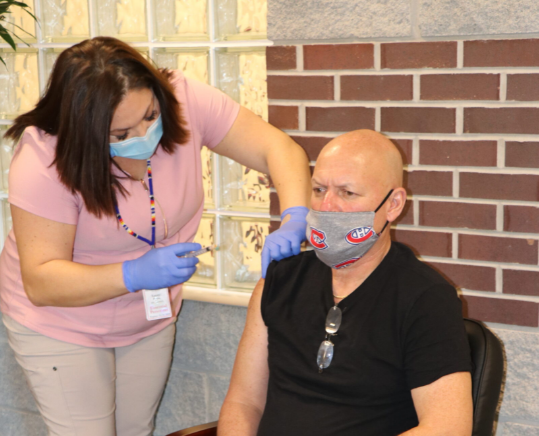
- Details
- By Reddog Sina, D.O.
EAST LANSING, Mich. — The United States Food and Drug Administration’s (FDA) recent approval of a Pfizer-BioNTek (Pfizer) booster has raised questions about the booster and who should get it. This article presents questions and answers based on information available at the United States Centers For Disease Controls and Prevention CDC) website.
Q: Which vaccines have available boosters?
A: The only booster that is currently available is Pfizer. The Moderna and Jansen-Johnson & Johnson (Johnson & Johnson) are still being considered for emergency approval.
Editor's Note: Late last week, The FDA approved the booster by both Moderna and Johnson & Johnson.
Want more Native News? Get the free daily newsletter today.
Q: Is the Pfizer booster different from the first two vaccine doses?
A: It is exactly the same as the first two doses of the Pfizer vaccine.
Q: Why would I need a booster?
A: Research has shown that the Pfizer vaccine becomes less effective over time, especially against the Delta variant. At first the CDC recommended waiting eight months after the second dose to get the booster, but now they are recommending waiting six months for people who have the following conditions:
1. People aged 65 and older
2. People aged 50-64 with underlying medical conditions
3. People aged 18-40 with underlying medical conditions with increased risk of severe illness from a COVID-19 infection
4. People aged 18 and above who live in long-term care, group homes, adult foster care, military and correctional facilities
5. People aged 18-64 who have higher risk of exposure at home or work
Q. Should I get a blood test to see if I have immunity?
A. No. That is more expensive and may not be accurate. If you meet one of the above criteria, it is recommended that you get the booster.
Q. Are there side effects?
A. Just as with the initial vaccine doses, people may have flu-like symptoms, arm soreness, or fatigue for around two days afterwards. People who have previously had a COVID infection may have worse symptoms, but those people with long-haul symptoms may get relief from the vaccine. There have been some more severe reactions, but they are uncommon.
Q: What if I have a severely decreased immune system?
A: People who are immune compromised get less of an immune reaction from the first two vaccine doses, and some studies suggest that they are much more likely to be hospitalized with breakthrough cases. They also may be more likely to spread the virus. Because of this, the CDC recommends they wait at least twenty-eight days after the second dose before getting the booster.
Q: Which medical conditions increase risk of severe illness from COVID-19 infection?
A: The CDC reports that certain conditions are more likely to cause hospitalization, going to intensive care, being put on a ventilator, or dying.
- Cancer
- Chronic diseases of the lungs, including moderate-to-severe asthma, COPD, cystic fibrosis, pulmonary hypertension, and interstitial lung disease
- Chronic disease of the Liver or Kidneys
- Diabetes, either Type 1 or 2
- Down syndrome
- Heart conditions including past heart attack, heart failure, high blood pressure, clogged arteries, diseases of the heart muscle
- HIV Infection
- Obesity (risk goes up with higher weight)
- Organ or stem cell transplant
- Pregnancy
- Sickle Cell or Thalassemia
- Smoking (currently or having already quit)
- Stroke or disease of the brain’s blood vessels
- Substance use disorders (such as alcohol, opioids, cocaine, other drugs)
- Weakened immune system
This list is not complete, but they are the most common conditions with increased risk. Many are even more common among American Indian and Alaska Native people than the general U.S. population.
Q: What kinds of workers have higher exposure risk?
A: This current list of high exposure workers list includes:
- First responders and healthcare workers
- School and daycare employees
- Food, grocery and agriculture workers
- Corrections workers
- Postal workers
- Public transit workers
Q: Can I mix vaccine brands?
A: It is better to stay with the same vaccine brand. There is some evidence that people who have received Johnson & Johnson may get increased immune response from getting either the Moderna or Pfizer booster, and it seems to be safe. There is no evidence to support mixing the Moderna and Pfizer vaccines.
Q: Does the Pfizer booster add anything for strains like the Delta variant?
A: It is the same vaccine as the two-shot sequence, but helps resist the Delta variant by increasing amount of antibodies available to fight the virus.
Q. Where can I get the booster?
A. The booster is available at the same locations that offer the first doses of the vaccine. According to the CDC, they can be found by searching vaccines.gov, texting your ZIP code to 438829, or calling 1-800-232-0233 to find locations near you. Some pharmacies may also have walk in availability.
Q: What does it cost?
A. There should be no cost; the vaccine has been purchased baby the federal government for public distribution.
Reddog Sina, D.O. is descended from the Inuit of NW Greenland. He is board certified and has practiced Family Medicine and Osteopathic Neuromusculoskeletal Medicine. He is an Assistant Professor in the Michigan State University College of Osteopathic Medicine.
More Stories Like This
Artificial Intelligence Impacts the Art and Science of Dentistry – AI Part 2Feds Announce $50 Billion to States for Rural Health, Tribes Barely Mentioned in Awards
Community Safety Alert Issued Over Out-of-State “Treatment” Transfers
Language is Medicine: Navajo Researcher Tackles Speech Delays in Native Communities
Artificial Intelligence Impacts the Art and Science of Dentistry - Part 1
